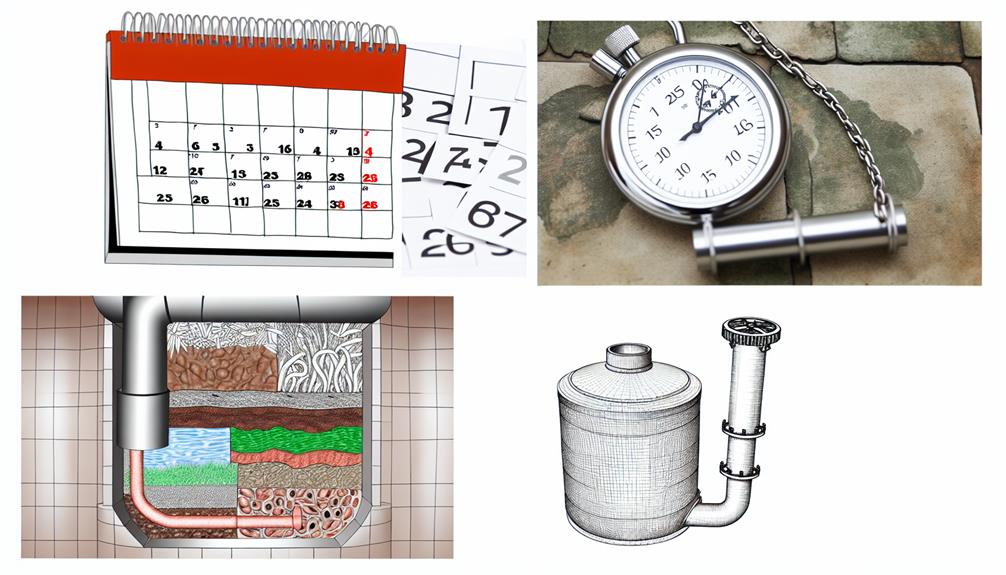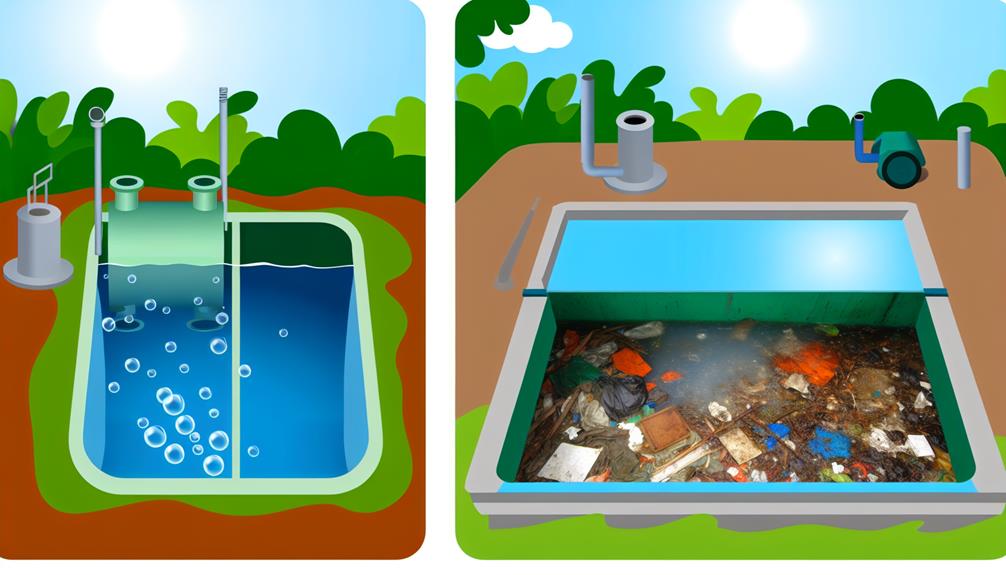Discover how to protect your septic system from breakdown with...
Read MoreYou & Your Septic Tank
Why Should Septic Tanks Be Pumped Regularly?
Our professional septic service team offers comprehensive septic tank pumping services to keep your system running smoothly. Get a FREE Quote Today.

Why Should Septic Tanks Be Pumped Regularly?
Like a well-oiled machine, your septic tank requires regular maintenance to keep it running smoothly. And one of the most crucial parts of this upkeep is regular pumping.
If you’re wondering why, think about what happens when you don’t empty your trash for weeks – it overflows, right? Similarly, if you don’t pump out your septic tank periodically, it’ll overflow too, leading to a host of unpleasant and potentially costly problems.
But how often should you pump, and what exactly goes wrong if you don’t? Well, let’s explore these points further.
Key Takeaways
- Regular pumping of septic tanks is essential to prevent overflow of solids and costly repairs.
- Overflowing septic tanks can contaminate groundwater and degrade water quality, leading to serious illnesses.
- Determining the pumping frequency depends on factors such as tank size, household size, and wastewater volume.
- Irregular pumping can lead to sewage backup, damage to the septic system, and harm to the environment.
Understanding Septic Tank Maintenance

Your septic tank’s regular maintenance plays a crucial role in its efficiency and longevity, requiring routine pumping to prevent hazardous backups and costly repairs. Let’s delve into the technical details to better understand your septic system’s components and their functions.
The septic system is comprised of three main components: the tank, the drain field, and the soil beneath the drain field. The tank holds your wastewater, allowing solids to settle at the bottom while lighter substances float to the top. The liquid in the middle layer, known as effluent, drains into the drain field.
Pumping your septic tank is vital because, over time, the accumulated solids can overflow, disrupting the entire system. If these solids reach the drain field, they can clog it, causing untreated wastewater to surface or back up into your home. This could lead to significant environmental impacts, contaminating nearby water sources and harming local ecosystems.
Proper maintenance, including regular inspections and pumping, ensures your system’s performance, safeguards your property’s value, and protects the environment. Understanding the importance of your septic tank’s maintenance is key to preventing unpleasant surprises and costly mistakes.
Importance of Regular Pumping
Regular septic tank pumping is a non-negotiable aspect of maintaining your system’s efficiency, preventing the overflow of solids that can lead to costly repairs and environmental harm. It’s not just about saving money; it’s also about protecting the environment and your health.
Let’s start with the environmental impact. Overflowing septic tanks can contaminate local groundwater, streams, and rivers with harmful bacteria and nutrients. This leads not only to the death of aquatic life but also contributes to the degradation of overall water quality. By pumping your septic tank regularly, you’re helping to protect your local ecosystems from harm.
Health implications are another significant concern. Overflow from septic tanks can cause serious illnesses if it contaminates sources of drinking water. Diseases like hepatitis, dysentery, and gastroenteritis are often associated with polluted water. Regular pumping helps to minimize this risk and safeguard public health.
Lastly, regular pumping extends the life of your septic system. It allows for the inspection of tank components and early detection of potential issues. In the long run, you’ll save on hefty replacement costs while ensuring your system runs smoothly. Don’t neglect the importance of regular septic tank pumping—it’s a small step with substantial benefits.
Determining Pumping Frequency

Determining the frequency at which you should pump your septic tank hinges on several critical factors, including the size of your tank, the number of people in your household, and the volume of wastewater generated. These factors create a unique pumping schedule for each property.
To make this easier to understand, let’s break down the main pumping indicators:
- Tank Size: Larger tanks can handle more waste, extending the time between pumpings. Conversely, smaller tanks fill more quickly and require more frequent service.
- Household Size: More people generate more waste. If your household grows, you’ll need to pump more often.
- Wastewater Volume: If your home or business generates a large volume of waste, your tank will need to be pumped more frequently.
- Seasonal Considerations: In colder climates, you might choose to pump your tank in the fall to avoid dealing with frozen ground in winter.
Costs Associated With Pumping
Factoring in the costs associated with septic tank pumping, it’s essential to consider variables such as the size of your tank, local disposal fees, and the distance from your property to the disposal facility. These factors significantly influence the overall expense, affecting pumping affordability.
The size of your septic tank directly correlates with the cost; larger tanks require more time and resources to pump, increasing the price. Typically, a standard septic tank holds around 1,000 to 1,500 gallons, with pumping costs ranging from $200 to $800. However, this can vary based on your location and the complexity of the job.
Local disposal fees also come into play. These costs are determined by local regulations and can vary significantly from region to region. It’s best to contact your local health department or waste management facility for accurate figures.
Lastly, the distance to the disposal facility affects costs. If your property is far from the facility, you may incur additional transportation fees.
Consequences of Irregular Pumping

While considering the costs involved in septic tank pumping, it’s equally vital to look at the repercussions of not adhering to a regular pumping schedule. Irregular or delayed pumping can lead to several issues, some of which pose serious health hazards and can have a severe environmental impact.
Here’s a breakdown of what you’re risking:
- Overflow and Backup: Excessive solid waste build-up can cause your septic tank to overflow, leading to sewage backup into your property. This isn’t just unpleasant; it’s a health hazard.
- Contamination of Water Sources: Overflows can contaminate nearby water bodies, leading to the spread of waterborne diseases.
- Damage to Septic System: Lack of regular pumping can severely damage your septic system, leading to costly repairs or even full replacement.
- Environmental Impact: Uncontrolled septic waste can harm local ecosystems, affecting plant and animal life.
Conclusion
So, you’ve learned why regular septic tank maintenance is crucial. Neglect it and face severe consequences. But how often should you pump? That depends on various factors.
Yes, pumping can be a bit costly, but remember, it’s cheaper than a system failure. And that’s a bill you really don’t want to foot.
Take care of your septic system, and it’ll take care of you. Will you heed this warning or face the consequences? The choice is yours.
You may also like...
Why Are DIY Fixes Essential for Septic Tank Pumping?
Tap into the importance of DIY fixes for septic tank...
Read MoreUnveiling the Average Costs of Septic Tank Pumping
Master the mysteries of septic tank pumping costs and avoid...
Read More
The Best Septic Tank Pumping Services Near You

Answer Some Questions
Let us know about your needs so we can find you the right septic tank pros.

Get Quotes
We will put you in touch with the right septic tank pros for your job and location.

Hire Right
Compare quotes, message or call pros, and hire only when ready.



